Share
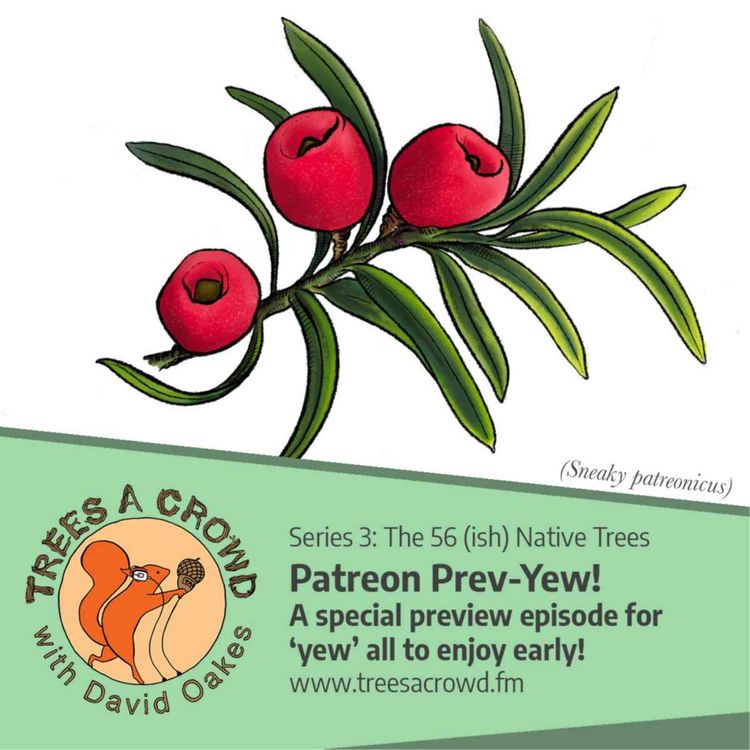
Trees A Crowd
Patreon Prev-'Yew'!
Season 3, Ep. 0
•
I love YEW all, YEW're wonderful - thank YEW for supporting "Trees A Crowd" through your Patreon givings!
Here a week before the public launch of the new series, is a taste of what is to come. My journey through the 56(ish) native trees of the British Isles. It's a little different to our usual format - but, it is temporary, and hopefully YEW'll enjoy it just as much...
...oh, and we're doing an episode WEEKLY!!! So, lots to look forward to.
So, until next week, where YEW'll have two more conifers to add to this tree, thank yew, thank yew, thank yew!
From David and all at TAC!
More episodes
View all episodes

12. M G Leonard: Storytelling and the power of Beetles! “Elytra Literature” from Shakespeare to Starship Troopers.
01:00:24||Season 5, Ep. 12A writer concerned with wondrous beetles and beautiful birds, M G Leonard and her award-winning books, for the past decade, have been inspiring the entomologists and ornithologists of tomorrow. Here, Leonard joins Oakes on the banks of the river that inspired Kenneth Grahame's "The Wind in the Willows" for an episode about how Nature and Storytelling are vitally important in inspiring young (and old) minds. In an interview that spans the arts - everything from Shakespeare to "Starship Troopers" - David and Maya discuss why badgers walk like an actor called Michael Bryant, how Ladybirds are actually Transformers, why Entomologists hate "The Hungry Caterpillar", and why beetles deserve a co-credit for authoring Darwin's "The Origin of the Species". Most importantly, hear how Maya’s journey into our natural world was far from guaranteed; in reality, it was a wild journey forged through stories, storytelling and one or two lies. Initially just a "Bug Tourist", Maya is now the Vice President for the insect charity BugLife, and manifested the world's first Masters Degree in Entomology. All that, and how to survive if you were ever to find yourself in a battle against a human-sized beetle!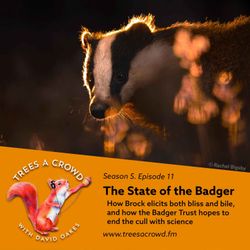
11. Dr Hannah Trayford & Rachel Bigsby: The State of the Badger, with the Badger Trust
48:09||Season 5, Ep. 11Britain and its rural communities have been obsessed with Badgers for centuries. Sometimes cast as hero, sometimes as villain, tales of their behaviour can be found woven into the fabric of our nation's folk stories. They have since been immortalised in literature by the likes of Beatrix Potter and Kenneth Grahame. Their prominence in rural life continues into our modern Britain, where Badgers find themselves in the crosshairs of an ongoing cull. But are Badgers the villain of this new tale - persecuting farmers trying to make ends meet within our complicated food chain - or are they the unfortunate scapegoat in a politically-motivated act of extreme animal cruelty? David meets up with Dr Hannah Trayford, the Badger Trust Campaigns and Research Manager, and award-winning photographer Rachel Bigsby, the Badger Trust Youth Ambassador, to understand a little more about the realities of the ongoing cull, and the (lack of) science backing it up. Is it justifiable to cull 50% of the national Badger population, when it is 800 times more likely for cattle to spread Bovine Tuberculosis to Badgers, than the other way around? And if that all sounds too dour, then fear not, for the first 20 minutes of this podcast is actually about Orang-utans and the joy of photographing sea birds!
10. Matthew Oates: A Paean to the Purple Emperor. One Man’s Passion-filled Past Devoted to Great British Butterflies
52:10||Season 5, Ep. 10Matthew Oates is a naturalist, nature writer, and poet with a lifelong passion for butterflies. In the short sward of the Cotswolds, Matthew takes David Oakes on a journey through his fluttery past. They discuss the writers who have inspired him, from Tolkien to Wordsworth and W.H. Hudson, and share stories of other notable butterfly enthusiasts, such as Sir Winston Churchill. Matthew explains his belief that true conservation is a blend of science and love. They also delve into the realities of developing a love for nature in the boarding schools of the Swinging Sixties - a time when his generation transitioned "from Molesworth to Jimi Hendrix in just three years," leaving little room for butterflies or a life-defining obsession with the intoxicating Purple Emperor. Their conversation also addresses modern concerns for butterfly conservation, including pathogens and parasites, the risks of unsanctioned releases, and the importance of single-species ecologists - “insects shout loudest and first.” Ultimately, this is a discussion about the metamorphoses of both the past and the future.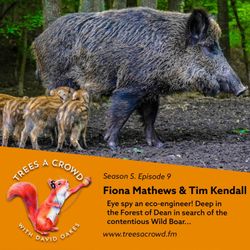
9. Tim Kendall & Fiona Mathews (PART TWO): Eye spy an eco-engineer! Deep in the Forest of Dean in search of the contentious Wild Boar...
34:51||Season 5, Ep. 9In the second part of David Oakes' interview with Professors Fiona Mathews and Tim Kendall, the mammal-enthused trio head into the Forest of Dean in search of Wild Boar!Fiona Mathews is a professor of Environmental Biology at the University of Sussex and the founding Chair of Mammal Conservation Europe; Tim Kendall is a professor of English Literature and Creative Writing at the University of Exeter, and; their dog Charlie Brown is an especially trained labrador with the talent for locating the bodies of bats that have been killed or injured by wind turbines, all in the name of conservation science. Together, they wrote the Wainwright award-nominated book “Black Ops & Beaver Bombing: Adventures with Britain’s Wild Mammals”. In this two part interview, hear how Fiona’s construction of the Red List for British Mammals informs our Government and has lead to cutting edge mammal conservation projects. They discuss the British Coypu population that caused concern in the 1980s, the effectiveness of the mysterious “Beaver Bombers” secretly releasing animals across Europe, and the tale of the lone Scottish Pine Marten that ended up in Georgia, USA (a fate subjectively worse than the Beech Marten who got stuck in the Large Hadron Collider!) The trio of Fiona, Tim and David (alas without Charlie Brown) then head into the Forest of Dean to locate the most contentious of Britain’s mammals – the Wild Boar!
8. Fiona Mathews & Tim Kendall: Wild Mammals are far from 'Boar-ing'
45:08||Season 5, Ep. 8Fiona Mathews is a professor of Environmental Biology at the University of Sussex and the founding Chair of Mammal Conservation Europe; Tim Kendall is a professor of English Literature and Creative Writing at the University of Exeter, and; their dog Charlie Brown is an especially trained labrador with the talent for locating the bodies of bats that have been killed or injured by wind turbines, all in the name of conservation science. Together, they wrote the Wainwright award-nominated book “Black Ops & Beaver Bombing: Adventures with Britain’s Wild Mammals”. In this two part interview, hear how Fiona’s construction of the Red List for British Mammals informs our Government and has lead to cutting edge mammal conservation projects. They discuss the British Coypu population that caused concern in the 1980s, the effectiveness of the mysterious “Beaver Bombers” secretly releasing animals across Europe, and the tale of the lone Scottish Pine Marten that ended up in Georgia, USA (a fate subjectively worse than the Beech Marten who got stuck in the Large Hadron Collider!) The trio of Fiona, Tim and David (alas without Charlie Brown) then head into the Forest of Dean to locate the most contentious of Britain’s mammals – the Wild Boar!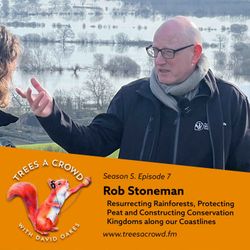
7. Rob Stoneman: Resurrecting Rainforests, Protecting Peat and Constructing Conservation Kingdoms along our Coastlines
01:00:34||Season 5, Ep. 7Rob Stoneman wanted to make lots of money in the oil industry… and then he found peat! This episode is a deep dive into that blancmange-like substance that should be our saviour. Also, the Wildlife Trusts’ plans to grow a new rain forest in North Wales and Rob’s dream of having a mile deep nature reserve that circumnavigates the entirety of the British Isles coastline.A geologist at source, Rob has grown into a leading expert on the pragmatism required for landscape reform on the British Isle. Before becoming the inaugural Director of Landscape Recovery at the Wildlife Trusts, Rob managed vast areas of burgeoning biodiversity across the European continent for Rewilding Europe. Prior to that, he ran the Sheffield, then Hampshire and then the Yorkshire Wildlife Trusts.Rob and David tackle some genuinely daunting subjects: green finance and carbon credits, the feasibility and required timescale for achieving carbon neutrality, the post-Brexit opportunities for reformed agro-subsidy schemes, the potential symbiosis between nature tourism and food production, how conservation NGOs collaborate without becoming an enviro-cartel, and there’s even time to squeeze in a compliment to none other than Michael Gove(?!)And if that doesn’t float your boat, then stick around for the bison, the elk, and the pumas that prey upon guinea pigs!
6. The Horstmann Trust: Vultures in the Valleys!
01:10:17||Season 5, Ep. 6The Horstmann Trust is a brand new charity primarily focused upon breeding and ultimately releasing back into the wild four species of endangered vultures: the Bearded, Egyptian and Hooded Vultures, as well as the Andean Condor. But what makes the Horstmann Trust particularly interesting, is that these birds are Welsh Vultures! In this episode, David heads to Wales to meet Holly Cale & Adam Bloch, the custodians of around 70 birds which were previously the private collection of a brilliantly eccentric Carmarthenshire-based German Hotelier called Manfred Horstmann. This is a meaty discussion. As well as dissecting the realities underpinning a successful breeding programme, it is one that explores the Vulture’s complicated relationship with Humans. From Vultures being worshipped by the Ancient Egyptians, and enabling Sky Burials in India (where our dead are not buried or cremated, rather taken, bite by bite, back into the air), to wiping out 99.9% of Southern Asian vultures though the veterinary use of anti-inflammatory drugs, or through ritualistic superstitions that require the dismemberment and smoking of Vulture brains in order to see into the future. And if that isn’t enough, this is a podcast about birds vomiting and pissing on their legs - what’s not to love?!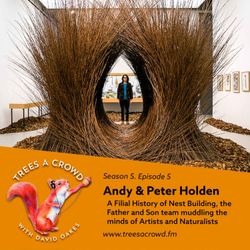
5. Andy & Peter Holden: A Filial History of Nest Building
55:15||Season 5, Ep. 5At the launch of his latest video installation at the Tate St Ives, artist Andy Holden meets with David Oakes to discuss the creativity present within the bird world. But, whilst exploring avian aesthetics, Andy's artwork - "A Natural History of Nest Building" - also explores the roles of nature versus nurture at an additional level. This exhibition, one exploring how and why Birds learn to create nest structures, is created by a father and son team; the son an artist, and the father a famous ornithologist. Which begs question: was this film, one about creating homes, nurturing eggs, and fledging one’s young, really just about birds? In this ornithological deep dive, Andy and Peter Holden discuss approaching a shared passion from opposite directions. You'll hear about the super-stimulus associated with the gaping beak of the infanticide-committing cuckoo, the individual spin that different birds of the same species place upon their own personal nests, and the complicated legacy of the mysterious egg-stealing Jordain Society. Andy Holden is a multi-faceted artist who has exhibited at the Tate Britain, has had music aired on BBC 6 Music, and has created everything from human-sized bower-bird bowers, to enormous knitted rocks based upon a piece of pyramid which he stole as a boy. His father, Peter Holden MBE, worked for the RSPB for almost 40 years to boost their youth engagement. He was most notably instrumental in developing their “Big Garden Birdwatch” - the UK’s first 'citizen science' project, which has been running now for 45 years, and counted around 190 million birds.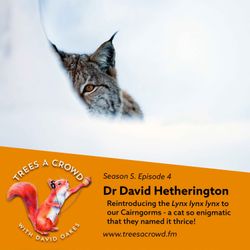
4. Dr David Hetherington: Reintroducing the Lynx lynx lynx to our Cairngorms (a cat so enigmatic that they named it thrice!)
01:02:29||Season 5, Ep. 4Dr David Hetherington is an expert on the Eurasian Lynx and the beneficial links Lynx (Lynx lynx lynx) can manifest within our complicated British ecosystems. What he doesn’t know about the Lynx’s rich history across Europe is not worth knowing: Hear why Hildegard von Bingen thought drinking Lynx urine was highly beneficial; when exactly(ish) Lynx were wiped from British shores leaving only one town name with any form of association to a once indigenous species, and; how the Nazis could be considered the twentieth century’s first big-mammal “re-wilders”. But, most importantly, David answers the big question: does Britain have enough well connected forest habitat to safely support a large mobile forest-dependent species? Specialising in species reintroduction programmes, David managed the Cairngorms Wildcat Project and actively encouraged a positive relationship with gamekeepers to help all parties work for nature conservation without getting “sucked into the vortex of raptor politics”. He also sits on the board of Trees for Life - an award-winning charity that works to enhance the native woodland ecology of the Scottish Highlands. To that end, expect wildcats, red squirrels, pine martens, capercaillies, as well as the animal so cool they named it thrice, Lynx lynx lynx, in this immersive and informative wildlife deep dive.